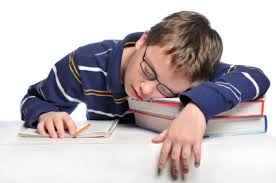Are you sleeping well?
August 19, 2016
By Psychology Department
As you look to set your child up for success this school year, be sure to not overlook one crucial area: sleep.
It is estimated that as many as 80% of children with Autism Spectrum Disorder (ASD) have difficulties falling asleep and/or staying asleep. Additionally, chances are that your child has drifted away from his or her school-based bedtime routines due to the more leisurely pace of summer. Sleep is the glue that holds everything together and has important benefits not only for physical well-being, but also for learning, behavior, and emotional development. In addition to increased daytime drowsiness, a poor sleeper may be more irritable, short-tempered, emotional, hyperactive, aggressive, and/or have difficulty learning new skills. Conversely, well rested children (as well as teens and adults) are more even tempered, adaptable, alert, ready to learn, and have a higher tolerance for frustration.
 The average hours of sleep needed by children varies across ages. Children ages 1-3 typically need 12-14 hours, ages 3 to 6 need 10-12 hours, and ages 7 to 12 need 10-11 hours. Teens typically need 8 to 10 hours of sleep each night. For young children, these sleep guidelines also include naps. Most children do not nap after the age of 5, although some continue to require naps. Naps should be well-timed, as those that are too long or too close to bedtime may interfere with the quality of nighttime sleep. Additionally, naps intended to make up for lost nighttime sleep may further disrupt the sleep-wake biological rhythm. Despite these guidelines for sleep, it’s important to remember that each child is an individual, and he/she may need more or less sleep. Observations of your child’s behavior may help you to determine whether you need to adjust their sleep schedule. For example, a child who becomes more irritable or hyperactive in the evenings may actually need an earlier bedtime.
The average hours of sleep needed by children varies across ages. Children ages 1-3 typically need 12-14 hours, ages 3 to 6 need 10-12 hours, and ages 7 to 12 need 10-11 hours. Teens typically need 8 to 10 hours of sleep each night. For young children, these sleep guidelines also include naps. Most children do not nap after the age of 5, although some continue to require naps. Naps should be well-timed, as those that are too long or too close to bedtime may interfere with the quality of nighttime sleep. Additionally, naps intended to make up for lost nighttime sleep may further disrupt the sleep-wake biological rhythm. Despite these guidelines for sleep, it’s important to remember that each child is an individual, and he/she may need more or less sleep. Observations of your child’s behavior may help you to determine whether you need to adjust their sleep schedule. For example, a child who becomes more irritable or hyperactive in the evenings may actually need an earlier bedtime.
Fortunately, if your child is not sleeping well, behavioral and environmental changes often help. Here are some tips:
- Limit screen time close to bedtime. Tablets, phones, and computers can be especially disruptive to sleep due to the proximity to the user’s eyes. Turn these devices to “night mode” in the evenings when possible. It is also best to not have electronic devices (used for entertainment purposes) in the child’s bedroom.
- Avoid sugary snacks and drinks (including caffeine in chocolate and sodas) in the evenings.
- Get some exercise after school, but avoid stimulating activities too close to bedtime.
- Establish a calming and predictable bedtime routine lasting about 20-30 minutes that includes relaxing activities such as reading and listening to soothing music. Dim the lights in the room during these routines. Incorporating relaxation techniques such as deep breathing and yoga may also be helpful. Your child’s psychologist can also help teach more advanced techniques such as progressive muscle relaxation.
- It may be helpful to create a visual schedule for your child to follow each evening, which outlines his or her routine. Your child’s PBS or psychologist can assist in developing such schedules.
- Try to be as consistent as possible in implementing bedtime routines. Keep bedtimes and wake-up times as consistent as possible, even on weekends.
- Create a restful sleep environment by keeping your child’s bedroom cool, dark, and quiet. Use of a white noise machine, calming music, etc. can help drown out household noises as well as have a calming effect at bedtime.
- If you find your child needs to adjust their bedtime or wake-up time, try moving these times 15 minutes earlier each day or every few days until your child has adjusted.
- If your child is continually resisting their bedtime, then reward systems may help. For example, your child may get to pick from a treasure box in the morning if they followed their bedtime routine in a cooperative manner and went to bed on time. Contact your child’s PBS or psychologist for assistance in designing such systems.
If your child is still experiencing difficulty falling/staying asleep despite your best efforts, it will be important to consider whether an outside variable is affecting your child’s sleep. Variables may include but not be limited to sleep apnea, sleep walking, sleep terrors, restless legs syndrome, anxiety, or depression. Talk to your child’s pediatrician or psychologist if you continue to have concerns after putting a consistent schedule in place or if you need further guidance in implementing sleep strategies. Your child’s pediatrician can also further evaluate the quality of your child’s sleep and provide advice on whether supplements (e.g., Melatonin) or sleep medications may be helpful if difficulties persist.
References and Further Reading:
https://www.autismspeaks.org/family-services/health-and-wellness/sleep
http://www.webmd.com/brain/autism/helping-your-child-with-autism-get-a-good-nights-sleep#2
« Previous
Program Expansion at Bridgeway Academy